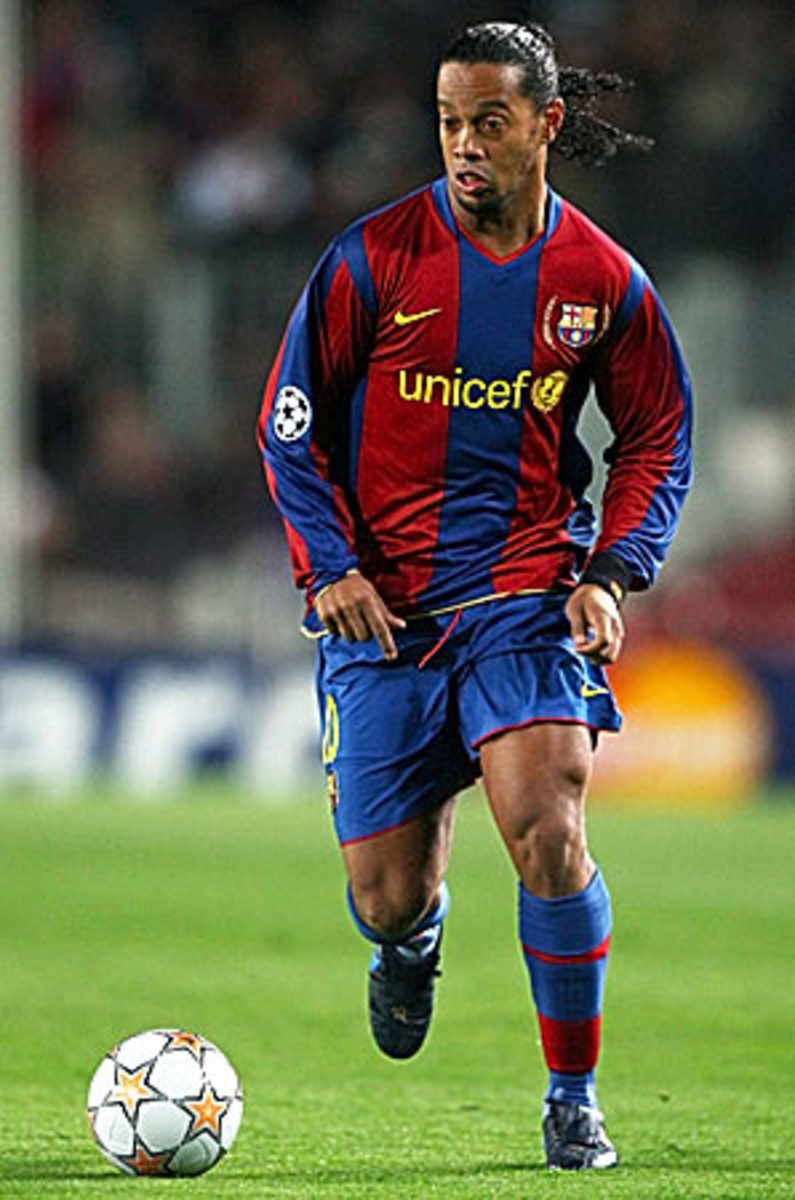
Economics lesson: What exactly are Ronaldinho and Ronaldo worth?
Many years ago, I was taught about the invisible hand and free markets and how, by definition, something was worth whatever someone was willing to pay for it. Of course, I've since learned that it's all a crock of bull. Some markets may work that way, but in fact, most of them don't.
Soccer is perhaps the most obvious example. Clubs pay large amounts of money in transfer fees and wages to acquire players. And the reality is that they don't have the foggiest idea of what the "right price" is.
Consider Ronaldinho's move to AC Milan and Cristiano Ronaldo's (as yet purely hypothetical) move to Real Madrid.
Milan has paid around $40 million (assuming they hit the basic targets that would trigger his bonuses, which seems more than reasonable) for Ronaldinho's services. Plus, he gets a three-year deal worth around $54 million pre-tax, which puts Milan's total bill for three years at around $94 million.
Ronaldinho is 28, which means he probably has, at best, five years left at the highest level. One of two things can happen. He does well, in which case he extends his contract -- say, another two years for $20 million a season -- probably through the end of his career (or, more precisely, his career at the highest level). At that stage, he'll either stay at Milan until he goes out to pasture (in which case he'll have little resale value). Or, he'll excel and be sold on to another big club in Europe, in which case, Milan could probably recoup, say, between $30 million and $40 million (though that possibility is highly unlikely).
Or, Ronaldinho can turn out to be flop. In which case, depending on when Milan sells him (and, therefore, how many years he has left), it can probably recover some $20 million to $25 million.
Still with me? OK. So, Ronaldinho does well and Milan's outlay is between $18 million (if he excels and is sold next summer) and a whopping $134 million. Or, Ronaldinho does badly and it's between $30 million (if he flops and is off-loaded straight away) and $94 million (if Milan is stuck with him for the duration of his contract).
And what about Ronaldo? According to the Spanish press, Real Madrid has budgeted $160 million to sign him. Forget that number, it's 100 million euros, a nice round sum to impress the fans. Realistically, if the deal is done -- and I'm just speculating here -- I doubt it will be more than $100 million. (Even then, at that amount, Manchester United should bite Real's hand off).
Real has a huge advantage in terms of wages, in the sense that they can use a well-known loophole in Spanish tax law which allows him to pay an 18 percent rate on the bulk of his taxes. That means it can pay $20 million a year and he'll still get a hefty raise.
Obviously, he'll get a salary bump if he does well. Let's assume he excels, sticks around 10 years and his salary eventually averages out to $30 million a season. Real's outlay would be around $400 million.
Ronaldo is 23. That means, crucially, that he has re-sale value. Again, that will depend on his performances, his age, and interested buyers. But odds are, for the next four years or so, if he maintains his current level, Real will know it can get its money back.
After that, his potential fee will start to decline. But, of course, if he sticks around three or four years, it won't matter because, presumably, Real will want to keep him (and shower him with more massive contracts).
Will either club make enough money back to recoup their investments?
Broadly speaking, there are two main ways that players help their clubs make money. (Two minor ways are increased TV revenues and greater box-office sales, but Milan and Real Madrid are so big already that a single player generally won't impact those). The first is commercial deals: sponsors, merchandising, increased revenue from pre-season tours, etc. Ronaldinho has already proven himself in that department, Ronaldo is just about to. Neither is on a level with David Beckham, of course, but both can pack a punch. Quantifying just how much they might offer up in additional commercial revenue is very difficult -- realistically, I doubt it's much more than $5 million to $10 million a season.
The other revenue stream comes from prize money, both domestically and in the Champions League. If they can make their team better, they will finish higher up the table (or go further in European competition) and make more money. Simple as that.
But how do you quantify that? Would Manchester United still have won the title last season without Ronaldo? (Possibly.) Would it have still won the Champions League? (Maybe.)
The fact is that here you get into a real minefield of conjecture. And there is no scientific basis to truly estimate how much better a single player can make a team.
But maybe it's not such a bad thing. Maybe it's good that we have these gray areas, these uncertainties, these question marks. Maybe it's good that you can't scientifically analyze the numbers and figure out what makes sense. Maybe it's good that Billy Beane and "Moneyball" have no place in this sport.
Both Milan and Real Madrid (assuming the Ronaldo deal gets done) will have taken enormous gambles -- risks which probably defy logic. Ronaldinho's downside -- if things don't work out -- is huge. Ronaldo's initial outlay is simply enormous. And, of course, both could get injured and seee their careers end in the blink of an eye.
Yet I, for one, am excited by both these moves. I like the fact that logic has made way for sheer guts. Then again, it's not my money that Milan and Real are playing with.





